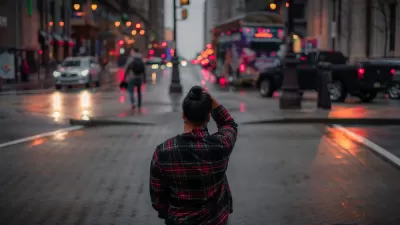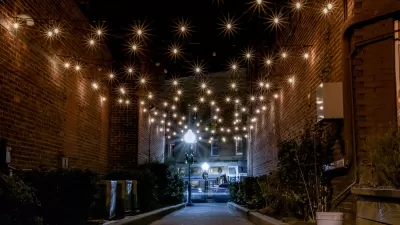Although walkable urbanism is often seen as a leftist priority, one writer argues that reducing car dependence actually closely aligns with conservative values.

Writing in The Spectator World, Addison Del Mastro makes the case for a conservative urbanism, defining the term as "an awareness of the built environment as an independent variable in human behavior, and a desire that our built environments be conducive to commerce and community at a human scale."
Del Mastro points to conservative thinker Russell Kirk, who called the automobile a "mechanical Jacobin," lamenting its effects on morality and the physical form of cities. "'Other lands,' he wrote, 'lack the space and adaptability of America, so that the popular automobile may destroy the beautiful cities of Europe and the pattern of centuries of civilization.'"
According to Del Mastro, "There is, in fact, much in urbanist discourse that should appeal to conservatives — many threads that jibe with a conservative view of human nature and society. Indeed, one can recapitulate the hubris of the automobile era in a vertical form, with the massive apartment tower, or the blocks-long, mixed-use development."
Conservative urbanism, Del Mastro argues, should focus on the potential of "very average cities and towns," the potential often stifled by "outmoded land-use regulations" and the primacy of the car. "This is the urbanism of the small backyard house, an extra means of income for a middle-income family or a starter home for a young one; it is the urbanism of the corner store, the walk-up apartment above it, the narrow street along which one can slowly drive or safely walk; the sort of built environments scaled to the person, and out of which ordinary people can fashion a local social and economic ecosystem."
FULL STORY: Conservatives should embrace urbanism

Maui's Vacation Rental Debate Turns Ugly
Verbal attacks, misinformation campaigns and fistfights plague a high-stakes debate to convert thousands of vacation rentals into long-term housing.

Planetizen Federal Action Tracker
A weekly monitor of how Trump’s orders and actions are impacting planners and planning in America.

San Francisco Suspends Traffic Calming Amidst Record Deaths
Citing “a challenging fiscal landscape,” the city will cease the program on the heels of 42 traffic deaths, including 24 pedestrians.

Defunct Pittsburgh Power Plant to Become Residential Tower
A decommissioned steam heat plant will be redeveloped into almost 100 affordable housing units.

Trump Prompts Restructuring of Transportation Research Board in “Unprecedented Overreach”
The TRB has eliminated more than half of its committees including those focused on climate, equity, and cities.

Amtrak Rolls Out New Orleans to Alabama “Mardi Gras” Train
The new service will operate morning and evening departures between Mobile and New Orleans.
Urban Design for Planners 1: Software Tools
This six-course series explores essential urban design concepts using open source software and equips planners with the tools they need to participate fully in the urban design process.
Planning for Universal Design
Learn the tools for implementing Universal Design in planning regulations.
Heyer Gruel & Associates PA
JM Goldson LLC
Custer County Colorado
City of Camden Redevelopment Agency
City of Astoria
Transportation Research & Education Center (TREC) at Portland State University
Jefferson Parish Government
Camden Redevelopment Agency
City of Claremont





























